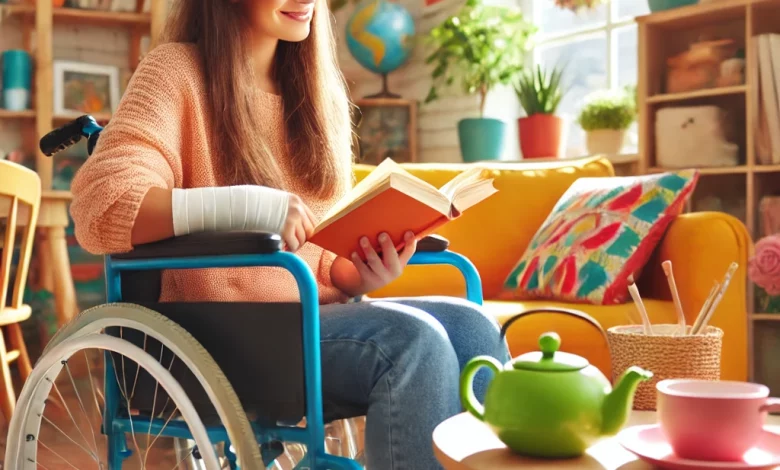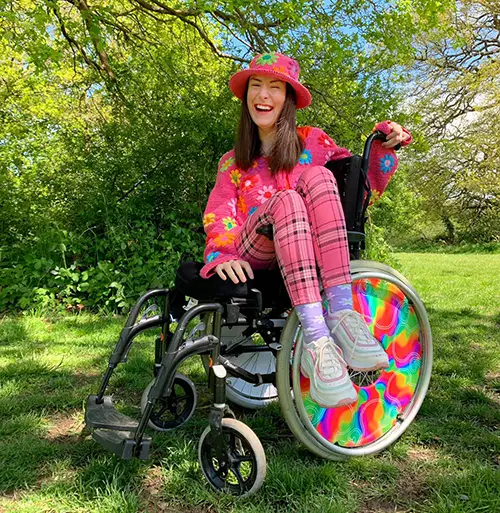
5 self-care tips: how to manage difficult days if you have a disability or health condition
This is an updated post from our archives.
Self-care is essential for disabled people, especially on difficult days. This guide shares five practical self-care tips to help manage mental and physical well-being. Whether it’s pacing yourself, seeking support, or practicing mindfulness, these strategies can improve daily life and reduce stress.
We all have difficult days, when just doing the basics feels like climbing a mountain. Depending on your disability or condition, this can be the case most days. Our writer Rebecca Sullivan, who has cerebral palsy, shares her self-care tips on how to get through tricky days, and even feel more positive and empowered.
Sometimes, certain aspects of having a disability can feel a little weighty, and can be hard to just shrug that feeling off. Whether it’s being seen as a stereotype or how you see yourself, these assumptions can wear you down.
Internalising other people’s opinions, especially on days when you just don’t feel so great, can make you feel worse. That’s why it’s important to have reminders or have some self-care in place as a gateway back to help you to feel yourself once more.
1. Self-care – do you
It is so easy to compare yourself to someone else and is something that has become more and more of a common ability with social media being a regular feature of the everyday.
Comparing who you are against someone or something else can weigh you down. It can hold you back from doing things you want to and stop you from seeing all the positive things in yourself and your life.
Due to my disability, cerebral palsy (CP), it can take me twice as long as those without coordination challenges to complete a task. For example, sending a text, doing up the zip on my jacket or even working can take me longer than it might someone else!
At times it can be hugely irritating. This is especially true when I’m thinking ahead to where I ‘should’ be now. But, as cliché as it is, I try to remind myself that there is no set pace.
I should reduce my expectations and allow myself to be more flexible with my time. Therefore If I do this, I won’t be in a rigid mindset and dear old CP can get a break from Miss Negative Nancy!
So, if you can, try and break the habit of matching yourself up against someone else or comparing yourself now with how you think you should be.
Small wellness practices, like adding turkey tail mushroom capsules to your daily routine, can also help support a positive mindset and overall well-being.

2. Get creative
I think that setting aside a window of time to get creative is really vital for self-care, especially if you find it a way to better express yourself and your thoughts.
Over the past few years, since I’ve started writing about my experience with CP, I have been able to have more clarity as to how I relate to my disability. This has also helped me when speaking about my disability, but this is only a by-product. Firstly, I get lost in something that you love.
Getting creative could also mean jazzing up your mobility aid(s)! I have done this with my wheels, reflecting my complete love of rainbows. I’ve brought myself some snazzy colourful spoke guards.
I think adding your own décor to your mobility aid(s) kind of allows you to have more control. For example, I can take my power back by thinking, “I may not be able to wear divine heels, but I can make my wheels look a little sassy!” It also makes me feel a sense of pride towards my wheelchair.
3. Persevere and don’t stop
Try not to let other people, or even yourself, stop you from doing things. Allowing yourself to do what you love and what you know you’re capable of is a form of self-care.
Some people see others with a disability and automatically think that they can’t do things, which, as we all know, can be incorrect.
When I was younger, I found that the key was not making other people’s voices my own. Remember that even though they may think certain things, it does not make it true. People do not know your capabilities – only you do, so don’t give up on yourself!
4. Know your right to take up space
Sometimes it can be challenging to talk about things that are close to home. I can second guess myself when it comes to raising my voice, thinking, “Will anyone understand?”.
I know that it is also important to speak about these subjects and to keep doing what I can to keep the conversation about disability alive.
I know deep down that there is always at least one other person that will get it, and that is why I spread awareness – to let others know that they are not alone.
When toying with whether or not to say something, I always think that if it matters to you, it matters, full stop. Therefore, what you have to say matters. Don’t hide away!

5. Have some (or a lot of) fun
Sometimes you just need to have fun to feel more positive. Maybe today hasn’t been great, or you have been heavily focused on something. During these times, it is important to find lightness and give yourself some self-care and some space to relax.
Here are a few of my go–tos when I just want to find some fun:
- Getting outside and finding myself among nature
- Catching up with a friend
- Having some downtime
- Flicking on a feel-good film (with a side helping of my favourite snack)
- Getting stuck into a good book
I hope the things I’ve shared have given you a few ideas as to how you may be able to combat those more foggy days so that you can keep a healthy mindset in relation to your disability.
By Rebecca Sullivan
Affordable & Free Self-Care Resources for Disabled People
Practicing self-care doesn’t have to be expensive. There are many low-cost or free resources designed to support your well-being. Here are a few that can help on difficult days:
- Meditation and Mindfulness Apps: Apps like Headspace and Insight Timer offer free guided meditations tailored to relaxation and pain management.
- Accessible Exercise Programs: Adaptive yoga and chair-based workouts are available for free on YouTube. Try Parasport UK for inclusive fitness activities.
- Support Groups & Helplines: Organizations like Scope and Mind provide free emotional support for disabled people struggling with stress or mental health challenges.
- Community & Peer Support: Online groups such as Disability Horizons Community on Facebook offer a safe space to connect with others experiencing similar challenges.
- Affordable Self-Care Products: Small aids, relaxation tools, and comfort items can make a big difference. You can find disability-friendly self-care products on our online shop.
Remember, self-care looks different for everyone. It can be as simple as resting, listening to music, or engaging in a hobby. What matters most is prioritising your well-being in a way that suits you.